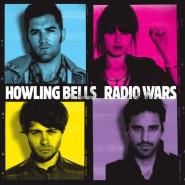 Howling Bells
Howling BellsRadio Wars
Score: 52
Despite having been active since 2004, Howling Bells released what is only its second album this week, following up on its debut, self-titled album of 2006. This disparity in experience - inexperience producing albums and experience working as a band - shows clearly on Radio Wars. While the tracks are nearly always well constructed at least as far as independent elements go, the tracks as a whole are monotonous, uninteresting, and sleep-inducing.
Juanita Stein’s voice carries the same curious combination of weight and subtlety common to many bands which mix an electronic aesthetic with indie-styled music. And while hers is unique enough to distinguish Howling Bells from other bands of this sort, they don’t quite succeed at making it terribly interesting, hampering it with the distracting backing vocals that appear on several tracks, including “Treasure Hunt” and “Ms. Bell’s Song.” Stein’s vocals also often seem oddly muted, preventing them from rising above the rest of the music (which amounts to a backdrop of sound) or helping the band to distinguish one moment of Radio Wars from the next. Combined with prominent repetition, this lack of genuine energy leaves the vocals rather lackluster. It’s not that they’re badly done - they’re simply uninteresting.
As with their last album, Howling Bells has done a commendable job writing lyrics for Radio Wars, but many of the best lines slip irretrievably into the somewhat dull sound. Slightly generic but well-written lyrics like “Dreamt of rising water / It was the love that filled the sea” mix with more original lines like “We are the key that fits / We are the world that radiates,” creating an intriguing collection of images and ideas. However, this strong lyrical base is weakened by repetition; lines such as “The city’s burning down again” are extremely overused.
Radio Wars presents a number of instrumental lines that are truly beneficial to the album. Sadly, these moments come too little too late. While “Treasure Hunt” is initially satisfying, with the synth part adding necessary inventive elements to what otherwise is a powerful but remarkably simple track, it soon begins to drag. The track is followed by “Cities Burning Down,” the second longest track on the album, which, despite the offbeat accents coming from the drummer, remains uncompelling. The album continues to regress until it meets its lowest point, “Nightingale,” which is simply forgettable, and while “Let’s Be Kids” provides a different sound from the previous four tracks, it makes the listener long for another “Treasure Hunt.” The album then continues to drag on with decently constructed but dull elements.
“Into the Chaos,” the eighth of ten tracks, is the first that truly supports itself through all of the repetition Howling Bells seems to love, simply because it picks a more active tempo and uses significantly more intricate drum and guitar lines which remain interesting through the track. Next is “Digital Hearts,” which follows “Into the Chaos” not only chronologically but methodically, retaining the same sense of speed that pushes the track through its monotony.
Radio Wars contains many of the elements of a good album, including interesting, well-integrated vocals and polished sound; however, when Howling Bells combined these parts, they managed to leave the album somewhat lacking. Radio Wars is a middling album, but not much more: it rarely harnesses the possibilities of any of its elements, and is left oddly tiresome. It’s quite evident that Howling Bells has lost some of the energy it possessed on its first album - the sophomore slump has reared its rather disappointing head. Nevertheless, Radio Wars isn’t bad: it’s passable. But Howling Bells could do much better.
This post is tagged 50-59, Howling Bells